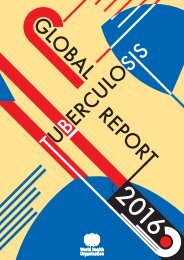patients
DNDi_AR_2015
DNDi_AR_2015
Create successful ePaper yourself
Turn your PDF publications into a flip-book with our unique Google optimized e-Paper software.
CHAGAS DISEASE<br />
› Chagas disease is endemic in 21 Latin American<br />
countries and in the USA, and is of increasing concern<br />
in Europe due to migrant populations. The asymptomatic<br />
nature of chronic disease means that it is difficult to<br />
know exactly how many people are infected, but current<br />
estimates are of 5.7 million people in Latin America alone,<br />
indicating that more than 6 million people are likely to be<br />
affected worldwide. It is the leading cause of infectious<br />
cardiomyopathy in the Western hemisphere. Chagas<br />
disease mostly affects those living in poverty, and to<br />
date less than 1% of people infected with Trypanosoma<br />
cruzi have access to diagnosis and treatment, despite<br />
the fact that more than one-half of Chagas disease<br />
sufferers live in Latin America’s wealthiest countries –<br />
Argentina, Brazil, and Mexico. The only drugs developed<br />
which successfully kill T. cruzi parasites are nifurtimox<br />
and benznidazole, both<br />
more than 40 years old,<br />
and although effective,<br />
they are used as long<br />
treatment regimens<br />
and cause frequent side<br />
effects. Benznidazole is<br />
currently produced in<br />
Brazil and Argentina.<br />
The benznidazole/fosravuconazole (E1224) trial carried<br />
out by DNDi and partners confirmed the long-term<br />
efficacy of benznidazole, although with the already<br />
observed side effects, and further trials are planned to<br />
evaluate shorter treatment courses and lower doses of<br />
benznidazole with and without fosravuconazole, aiming<br />
to maintain or increase efficacy and improve safety.<br />
In addition, the recently completed Merck-sponsored<br />
STOP Chagas trial in adults with asymptomatic chronic<br />
disease confirmed the efficacy of benznidazole and<br />
the lack of sustained effect by the azole class of<br />
compounds as treatment for Chagas. However, the<br />
BENEFIT (Benznidazole Evaluation for Interrupting<br />
Trypanosomiasis) trial showed benznidazole treatment<br />
was not effective in preventing progression of disease in<br />
<strong>patients</strong> with known Chagas cardiac involvement. These<br />
Improving<br />
treatments<br />
and access to<br />
medicines<br />
Health workers at the Mizque health care centre, Cochabamba, Bolivia.<br />
results highlighted the importance of early diagnosis and<br />
treatment of Chagas <strong>patients</strong>. Fexinidazole is also being<br />
evaluated in adults with chronic indeterminate disease<br />
and early stage drug discovery efforts are aiming to<br />
identify entirely new chemical entities for development.<br />
In response to the lack of access to treatments, DNDi<br />
proposed a project to assess the feasibility of scaling up<br />
treatment and access to benznidazole, in five countries<br />
in the Americas. Previous work undertaken has shown<br />
an important paradigm shift over the past two years,<br />
from discussing vector control to focusing on the urgent<br />
need to scale up access to diagnosis and treatment in<br />
Latin America. Throughout 2015, DNDi has worked<br />
closely with the Colombian Chagas National Control<br />
Programme, providing technical support to create the<br />
enabling environment<br />
needed to scale up access<br />
to diagnosis and treatment<br />
for Chagas in Colombia.<br />
As a result of meetings<br />
and discussions between<br />
the Ministry of Health,<br />
the National Control<br />
Programme, and the<br />
Red Chagas Colombia<br />
programme, a comprehensive roadmap for Chagas has<br />
been developed which defines operational interventions –<br />
such as implementation of pilot projects in four different<br />
regions in the country, registration of benznidazole,<br />
and support for validation of a new national diagnostic<br />
protocol for Chagas disease – which are due to start<br />
in 2016. A project in Mexico will focus on short- and<br />
medium-term approaches to further assess the disease<br />
burden, raise awareness, and ultimately improve patient<br />
access by working with the Ministry of Health and other<br />
stakeholders. Furthermore, there is the aim to identify<br />
and address barriers to access diagnosis and treatment in<br />
the USA, as there are large numbers affected by Chagas<br />
disease in areas with large populations from endemic<br />
countries – such as in California, Florida, and Texas –<br />
who are excluded from the healthcare system.<br />
36 › DNDi Annual Report 2015



